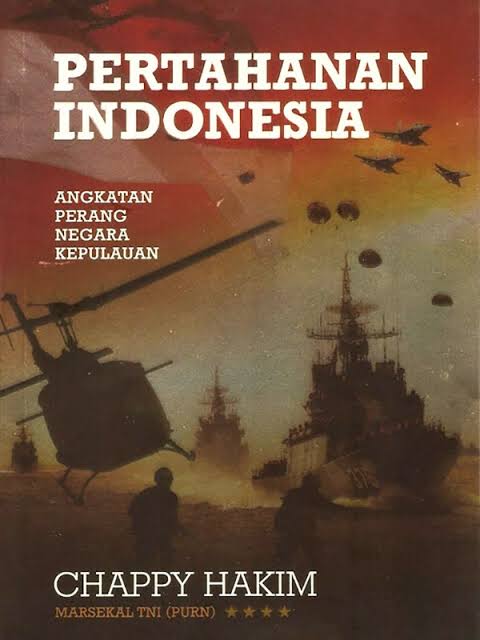By merely reading the title Pertahanan Indonesia — Angkatan Perang negara kepulauan (Indonesian Defense — the Armed Forces of an archipelagic country), one can immediately figure out what this book is all about.
Prior to reading the text, people can expect a comprehensive description of the conditions of the Indonesian Armed Forces or the Indonesian Military (TNI) in the post-Cold War, United States-dominated era.
After completing the book, one should have a pretty good understanding about the true conditions of the Indonesian Armed Forces, including the threats, challenges and opportunities that the forces are dealing with.
Pertahanan Indonesia is the 10th book by Air Chief Marshal (ret) Chappy Hakim, who was chief of the Indonesian Air Force from 2002 to 2005. The book is essentially a guidebook on the Indonesian military from the early years of Indonesian independence (after 1945) until today.
One can learn a chronological history of the Indonesian Armed Forces, as the book basically tells all the facts in brief and in order about those forces.
But, the 281-page book is easy-to-read literature. Although it contains a lot of military terminology and expressions, a novice reader can easily understand Chappy’s message, as the author makes an effort to select current words and terms.
While the book might be less meaningful to military personnel and those knowledgeable about military issues because it mostly discusses what they are probably already familiar with, the work is an important reference for those in the general public who are eager to know about their armed forces.
Apart from its goal to be a general guide and introduction to the Indonesian Armed Forces, the book focuses on the reforms of the TNI, particularly the establishment of equal status and opportunity for each of the three military branches — the Army, the Navy and the Air Force. That equality encompassed all aspects of military affairs, including equal status as part of the military’s integrated defense system for the nation, as well as equal opportunity for outstanding officers from each of the three forces to excel and reach the top as chief of the TNI.
The author repeated several times in the book the necessity of promoting equal status among the three forces. On page 15, for example, Chappy criticizes the New Order government for “placing” the Indonesian Army above the Navy and the Air Force, citing the appointment of Army officers to strategic posts within the Indonesian Armed Forces (ABRI) — the former name of the TNI.
At the same time, he also criticizes past highly political ABRI members, while referring to the ABRI’s political inclination towards Golkar — the ruling political party of the New Order government — thus placing ABRI officers, particularly Army officers, at strategic government posts as well as in Golkar, from regency and mayoral levels to the national.
On page 40, the author cites the “Naval Defense Policy” introduced by both the 8th century Sriwijaya Kingdom and the 15th century Majapahit Kingdom. Both were large and influential kingdoms in the past, and Chappy praises their naval policies while understanding the geographical and geological nature of both archipelagic kingdoms, being surrounded by water.
In reference to the subtitle of the book, “the Armed Forces of an archipelagic country”, the author asks the country’s policymakers and top leadership to seriously consider Indonesia’s archipelagic nature in developing its military/defense policies — immediately leaving behind Army-centered policies in place of integrated policies that will equally affect the three forces.
In several parts of the book, the author calls for the necessity of a careful evaluation of the country’s military and defense policies, citing the importance of having a strong armed forces and the need to upgrade the country’s military equipment in accordance with the latest technology — not necessarily meeting the country’s military might in the 1960s during Sukarno’s presidency, when Indonesia was second only to China in Asia — so as to increase the country’s “deterrent power” and political diplomacy.
Chappy quotes on page 145 a popular statement by British Admiral Horatio Nelson of the importance of having a strong armed forces: “A strong British naval fleet is the best [political] negotiator in Europe.”
Meanwhile, on pages 59-60, the author cites the 1941 Battle of Britain, when the fighter pilots of the British Royal Air Force (RAF) won the air battle against the German’s Lutwaffe just because their fighter planes were equipped with then newly invented radar, unlike the Germans, so that they could anticipate German planes long before the latter realized that they were already the targets of British pilots.
There are other aspects of military issues that Chappy has included in his latest book. But, it would be better for readers to read the book and discover for themselves whether their expectations for complete knowledge about the TNI have been met.
Pertahanan Indonesia — Angkatan Perang negara kepulauan (Indonesian Defense — the Armed Forces of an archipelagic country)
Chappy Hakim
Red & White Publishing, 2011
281 pages


